Biden 10
Los Angeles and the prelude to a Summit

Los Angeles and the prelude to a Summit (+ Video)
Some Miami-based anti-Cuba hate-mongers, especially in the South Florida media, have begun to appear, announcing their attendance to the Summit.
Translated and edited by Walter Lippmann for CubaNews.
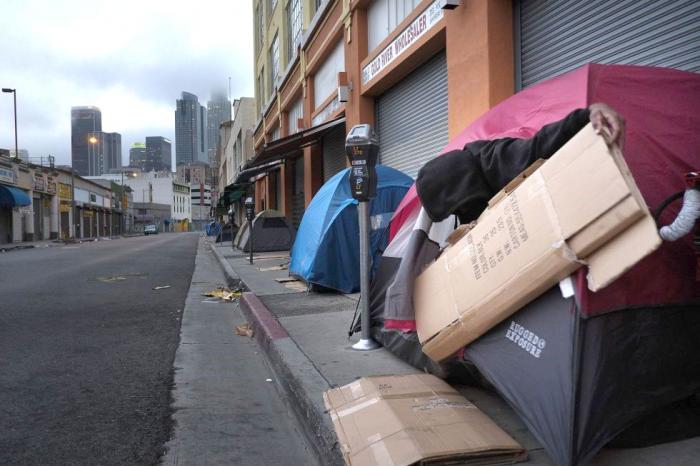
In Los Angeles, three out of four homeless people have no bed in any shelter or temporary solution. PHOTO: AP
Prelude to the Summit of the Americas in Los Angeles, United States, at the end of the first weekend of June, the meeting continues to suffer from a “strange” silence on the part of its hosts and, except for a last-minute invitation to the President of the Spanish government to attend as Joe Biden’s guest -is it that Spain is in America?-, little is known about the subject.
The invitation from across the seas is focused on the issue of migrants. I am not very convinced that Biden’s power of persuasion can involve a country in this issue that continues to lead the European Union in unemployment, with a rate of 13.3%.
The U.S. administration hopes that Spain will agree to double or triple the number of temporary workers from Central America, according to Axios.
Regarding the participation of the President of Mexico, Andrés Manuel López Obrador [AMLO], it was reported that the U.S. President wishes his Mexican counterpart to accompany him in person at the meeting.
López Obrador has stated that, if Washington does not invite all the countries of the Americas to the Summit, he would not cancel his nation’s participation in the event, but would send his representative, the Minister of Foreign Affairs.
Also in the last few days, especially in the South Florida press, some Miami-based anti-Cuba hate-mongers have begun to appear, announcing their attendance at the Summit. The publications do not explain whether they are part of the so-called civil society, knowing that they are counter-revolutionaries of Cuban origin.
The rest of this poorly made movie has been put in the hands of the media related to its organizers so that they can “make a fuss” about the ups and downs and manipulations of the hosts, which are not at all transparent.
For the Spanish newspaper El País, the city is “the misery capital of the United States”, and argues that the number of “homeless” people there has increased by 23% in one year, and details that three out of four homeless people do not have a bed in any shelter or temporary solution.
Across the United States, there are 553,000 people sleeping on the streets.
According to the RT website, the “hidden face” of Los Angeles is its poverty rate. It is estimated that there are about 66,433 homeless people in the city, and the African-American population continues to be the hardest hit by this scourge, if one compares the proportion of 33.7% with the total population, since this community only represents 7.9% [of the whole].
ATTACK AGAINST THE PEOPLE`S FORUM REJECTED
The attacks against the headquarters of The People’s Forum, in New York City, have been rejected by institutions and social movements that warn of the action of right-wing groups in the United States, with the support of the police.
“From Casa de las Americas we send all our support and solidarity to the members of The People’s Forum (TPF), whose headquarters in New York City has been the object of an illegal attack by reactionary forces of the extreme right”, a communiqué from this institution states.
According to Prensa Latina reports, more than a dozen New York Police Department agents entered TPF without being invited and acted as security for the extreme right-wing, which carried out the illegal attack.
The Cuban Institute of Friendship with the Peoples (ICAP) expressed its strong rejection of the aggression against the organization.
It is noteworthy that this attack takes place when many TPF staff and leadership members are in Los Angeles organizing the People’s Summit for Democracy, ICAP stressed.
Joe Biden takes off his mask

Joe Biden takes off his mask
Let us always remember that, with or without masks, U.S. presidents have the endorsement of being champions of war, genocide, torture, the most criminal sanctions, being the only country in the world to use the nuclear bomb against defenseless peoples, etc., etc.
Translated and edited by Walter Lippmann for CubaNews.
When the President of the United States, Joe Biden, appeared without a mask at the North American Building Trades Union Legislative Conference, and there he assured them: “if I have to go to war, I will go to war with you, I mean it”, his country had, that same Wednesday, April 6, 8214 new deaths and 446,871 infections due to COVID-19.
The United States continues to lead the world in both negative indicators, with 705,284 deaths and 43,950,779 people infected. But this silent war that kills and maims is less and less talked about every day in the mainstream media.
It turns out that since the war in Ukraine and the crusade against Russia, organized by the Biden administration, the pandemic has moved to other levels of attention and, moreover, information to the American population has plummeted.
In his speech, the President assured his audience that “the U.S. will continue to support Ukraine. The U.S. will continue to support Ukraine and the Ukrainian people, and that this fight is far from over”.
He then announced that his administration continues to “supply Ukraine with the necessary weapons and resources”, and was pleased to report that he signed “another package to send more Javelin missiles (…), to continue to get an uninterrupted supply to the Ukrainian army”.
In turn, he promised to further increase sanctions and economic isolation against Russia.
On March 24, 1999, then-President of the United States, William Clinton -also a Democrat- was unmasked when he ordered -without consulting the UN- the bombing of Yugoslavia, killing thousands of civilians, using prohibited weapons such as depleted uranium and provoking the disintegration of that country.
And what about that Friday, February 16, 2001, when another U.S. president, Republican George W. Bush, ordered the bombing and invasion of Iraq, which has cost that Arab country more than one million dead, maimed and wounded, and where Washington still maintains military bases and troops, and appropriates -through Iraqi territory- natural resources from neighboring Syria, while supporting terrorist groups that destabilize that nation.
Now, when the government of Joe Biden and others pronounced themselves at the UN for the suspension of Russia from the Human Rights Council, it would be worthwhile, at least, [to ask] some questions and [make some] reflections, so as not to lose historical memory. Since the U.S. nuclear bombings of Hiroshima and Nagasaki, through those carried out against Yugoslavia, the invasion of Iraq, the attacks on Libya and the assassination of its President, the invasion of Panama, Grenada, Afghanistan, Yemen, and many others, has it ever been raised and achieved at the UN that U.S. governments be accused and expelled from the Human Rights Council?
So humanity, what are we talking about now when Russia is condemned for its actions in Ukraine?
Let us always remember that, with or without masks, U.S. leaders have the endorsement of being champions of war, genocide, torture, the most criminal sanctions, being the only country in the world to use nuclear bombs against defenseless peoples, etc., etc.
Final recommendation: put on your mask, President Biden, protect your people from the COVID-19 pandemic, work for peace, without war and without sanctions, and contribute – as you promised in your campaign, and have not fulfilled – to foster a friendlier and freer world.
Empty shelves in the U.S.?

Empty shelves in the U.S.?
The crisis caused by the pandemic is visible even in the country that sustains its abundance at the expense of the world.
Translated and edited by Walter Lippmann for CubaNews.

Empty shelves at a Trader Joe’s supermarket on Spring Street, New York. Photo: CNN
A news report, which seems unusual, is going around the world: CNN claims that there are shortages in supermarkets in the United States. It added that those who run the establishments do not see a solution in the short term, while “disgruntled” shoppers have given “vent to their frustration on social networks”.
Images of empty shelves at stores such as Trader Joe’s, Giant Foods and Publix astound those who still cannot believe the fact that there could be shortages in the land of consumerism.
According to CNN, the causes of the shortages are multiple. The two-year pandemic and the impact of the disease on the lack of personnel for functions such as transportation and logistics, which in turn affects the delivery of products and the restocking of stores.
The National Association of Grocery Stores indicates that many of its members have less than 50% of their workforce. Add to this a continuing shortage of truck drivers and record congestion at the ports.
$2.4 trillion was the value of U.S. imports in 2020, according to Statista. Demand for imported food products grew because it is cheaper to bring them in than to produce them. Consumption patterns that favor frozen and packaged products, which require a powerful industry for permanent supply, also play a role.
Due to the pandemic, import levels have decreased due to the impossibility of guaranteeing the transfer of goods from one country to another, and this affects the supply chain, to which is added the lack of suitable personnel to work, due to the increase of contagions within the country due to the circulation of the Omicron strain.
CNN reported that sick leave accounts for 60% of the total number of infections in the country, in addition to quarantine isolations and distancing protocols.
In addition to this situation, there are adverse weather conditions, with very low temperatures, as well as drought and fires that damaged crops such as wheat, corn, soybeans and coffee.
Today, in addition, the population is panicking about shortages and hoarding, which contributes to a further and rapid decrease in supply.
The increase in empty shelves and prices also poses a danger to Biden and the Democrats, as the Republican narrative exposes the ineffectiveness of the president, who promised, when he took office, to contain COVID-19 and economic dislocation for millions and millions of Americans. The crisis implied by the pandemic is visible even in the country that sustains its abundance at the expense of the world.
US maintains remittance restrictions

White House decides to maintain restrictions on remittances to Cuba
Translated and edited by Walter Lippmann for CubaNews.
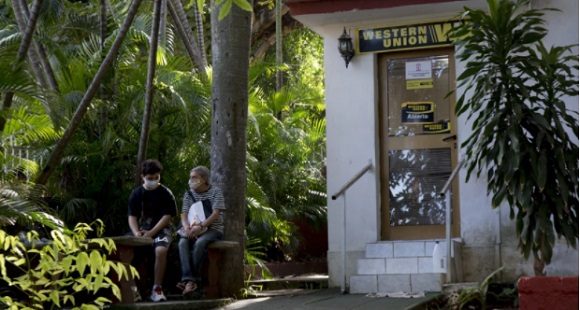
People wait to be served at a Western Union office on its last day of operations in Havana, Cuba, Monday, Nov. 23, 2020. Photo Credit: AP.
The U.S. government said Friday that the ban on sending remittances to Cuba will remain even longer, with which the White House hinders the right of families to help their loved ones living in the Caribbean nation.
A White House official told the media on Tuesday that the administration of President Joe Biden continues to study how to ensure that the money sent to the island does not favor the government of the largest of the Antilles, according to Reuters.
According to the source, the objective is to ensure that the benefits reach the Cuban people directly, although he did not mention how the U.S. economic blockade has been suffocating the inhabitants of the Caribbean country for six decades, even in the midst of the Covid-19 pandemic.
In July, Biden asked the Treasury and State Departments to suggest options for remittances to reach the beneficiaries, under the argument that the Caribbean nation’s executive appropriates between 20 and 40 percent of the remittances.
Last August, the manager of the Cuban commercial company Fincimex, Yamil Hernández, denied that the government of Havana or the armed forces obtained part of the amount sent from U.S. territory.
That theory repeated by politicians of the North American nation put an end to the relations of the Western Union company with the Cuban financial institutions in charge of processing remittances, specifically Fincimex, in October 2020.
The measure – imposed by former President Donald Trump (2017-2021) and maintained by the current administration – unilaterally ended the flow through regular and institutional channels, on the basis of totally unfounded pretexts, Hernandez asserted at the time.
The current U.S. president promised during his election campaign to change the hostile policy of his predecessor against Cuba, however, so far the 243 coercive measures imposed by Trump to reinforce the blockade remain unchanged.
(With information from PL)
Without masks… and with neocolonial garnish

Without masks… and with neocolonial garnish
The U.S. Government, which claims to be a Democrat, is disrespected when three senators from President Joe Biden’s own party set up a virtual conference with an interlocutor lacking in merit and authority, such as the Venezuelan Juan Guaidó.
Translated and edited by Walter Lippmann for CubaNews.
The Government of the United States, which claims to be democratc, is disrespected when three senators of President Joe Biden’s own party set up a virtual conference with an interlocutor lacking in merit and authority, such as the Venezuelan Juan Guaidó. There, in addition to giving him guidance on the peace process and the upcoming elections, they put the neocolonial garnish of insults against the Government and the democratically-elected president, Nicolás Maduro Moros. Do they really believe they have the right to such action?
That such slips occurred in the Republican government of Donald Trump, although immoral, was contemplated as one more of those actions displayed by the president, where irrationality and fundamentalism were determinant.
It is incredible that, at this point in time, a Democratic administration in a country where law and order supposedly prevails, three members of Congress ignore everything and attack Venezuelan legislation and authorities and dare to establish a dialogue with a nobody like Guaidó.
The Yankees who protect him know very well that this gentleman has no capacity or morals whatsoever to speak and act on behalf of a country and a people against whom he has even asked for foreign military intervention since he has never been elected by Venezuelans to be their president.
Everything he does is illegal and illegitimate -including the money he takes or is allowed to take, in foreign banks where it remains as patrimony of the Bolivarian nation-.
Now it turns out that three legislators of the U.S. Congress, the number two of the Democratic majority in the Senate, Dick Durbin; the chair of the Foreign Affairs Committee, Bob Menendez, and the head of the subcommittee for Latin America, Tim Kaine, met virtually with Guaidó, under the suthat they were providing guidance and listening to views of the “interim president” of Venezuela.
This was an interventionist action far from the system of international relations, of respect for the laws and in defiance of the vast majority of the Venezuelan people. They democratically elected Maduro as President and together with him participate in the construction of a more just and equitable society, where solidarity and love predominate. This is quite the opposite of the hatred and confrontation used as a banner by the U.S. administrations and their internal lackeys.
According to EFE news agency, the U.S. senators and Juan Guaidó spoke about the “political impasse” facing Venezuela.
And that statement of “dead-end” could say it all, since both those in Washington who fabricated an “interim president”, as well as the character selected to carry that label, could be feeding ideas from the years of Donald Trump -and still present today-, of seeking a “solution” to unblock the dead-end with armed intervention, through the volatile border with Colombia. Interference is done “with a mask off” and with neo-colonial dressing, even though we are in the 21st century.
No originality in the script

No originality in the script
The purpose remains the same: to employ asphyxiating maneuvers until the prey loses all possibility of survival. The 243 measures of the U.S. administration to cut off the slightest maneuver of the Cuban government in the midst of the effects of the pandemic, bet on bringing the end of the pandemic closer.
Translated and edited by Walter Lippmann for CubaNews.
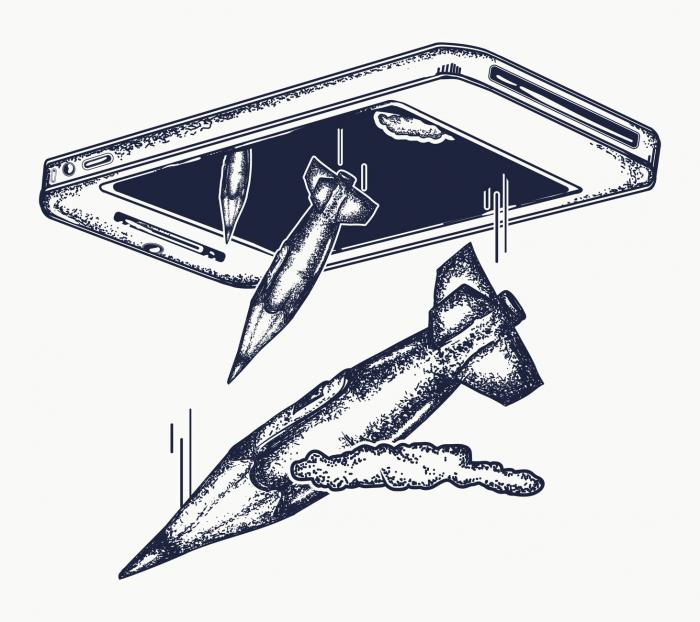
Photo: Illustration taken from Cubaenresumen
After six decades, the cast changes and the script remains the same. Such a long-standing political strategy requires operatives to renew the tactics in the field. The purpose remains the same: to employ asphyxiating maneuvers until the prey loses all possibility of survival. The 243 measures taken by the U.S. administration to cut off the slightest maneuver of the Cuban government in the midst of the effects of the pandemic, bet on bringing the end closer.
Faced with this scenario, Biden continued in the footsteps of his predecessors. Now, in a context that has even motivated the Pope’s reflections and rejection, the President must find pretexts to justify his policy towards the archipelago. Hence, the most active official of his government on the Cuba issue threatened the independent and sovereign nation of the Caribbean. To an international media, the principal director of National Security for the Western Hemisphere, Juan Gonzalez, declared that Washington will respond with sanctions if the promoters of the provocative march announced for November 15 in several cities of the country are prosecuted.
In recent months, through social networks, platforms through which the U.S. Government intends to build a parallel reality for Cuba and manage its interventionist strategy, the federal employee even exchanged with Cuban influencers to expose the vision of his administration towards the Island.
Promoting the “free flow of information”, supporting political operators associated with culture and “independent” journalism, as well as erasing the legitimacy of the Cuban Revolution in the international scenario, have been the matrices presented to the public opinion by the also advisor to President Biden. But these ideas need their correlate in practice in order to achieve their objective.
Weeks ago, in the midst of the VI Celac Summit, while several leaders were betting on cooperation to face the current scenario, a president chose “complacency” with Washington’s dictate towards Cuba, and was out of tune with a sepia speech on democracy and human rights.
To support these arguments in the international arena, the White House supports operators in Cuban territory. And now, once again, behind the “peaceful” discourse, the intention is to stage an event that articulates and advances the U.S. agenda and, furthermore, justifies it before public opinion. Whether or not the purpose has been achieved, the strategists have already ensured the counter-response: a justification to sustain the blockade and to point the finger once again at the Government of the Island for declaring such a “civic” expression unconstitutional.
The main promoter of the “peaceful march” has denied any link with organizations that respond to the US government; however, he himself revealed that the demonstration would be led by several citizens and civil society groups of which there is evidence of their financial and operational dependence on Washington. Among them, members of the self-styled 27N Movement and the Council for Democratic Transition. At the same time, all the press financed through projects of the NED, USAID and other organizations with similar purposes, maintains in its headlines any content related to the march or its organizers.
The date chosen for the performance could not be otherwise. They take advantage of the month and the day of the opening to international tourism, of the return to schools, of the restart of cultural life. Right now it is the information that the algorithms in the large servers of the social networks, all managed by U.S. corporations, rank in relation to Cuba.
Shortly before the mid-term elections that will renew Congress and one-third of the U.S. Senate, the Democratic Party runs the risk of losing control of Congress. The Republicans would only need five more seats in the House of Representatives and one in the Senate to regain the majority. In this dispute, despite not fulfilling his campaign promises, Biden reaffirms his votes with the most recalcitrant and powerful representatives of the Cuban community in the North American country.
A march or any other representation, in tune with the counterrevolution industry, will continue to be postable content in the profiles of U.S. government officials and agencies. Meanwhile, Cuba follows its own agenda. More than 7,000,000 people have received the complete COVID-19 vaccination schedule. Florida and Washington know it.
Cuba’s Place in the New Cold War
Translated by Walter Lippmann for CubaNews. If you doubt the assertion that we are facing a new cold war, by carefully reading the main international media and specialized publications you will be able to verify that -from different points of view- in a growing number of cases, the interpretation and hypothesis of a new cold war seems to dominate the most varied interpretations at present. This seems irrefutable when examining the growing tensions and conflicts from Brussels to Moscow, from the Arctic to the Black Sea, from the Caucasus to the Middle East, throughout the length and breadth of South and East Asia, bordering the land and sea borders of China and its neighbors, and in all of them the direct presence and gravitation of the US, from NATO that today touches Russia’s borders to a renewed alliance -like the defunct NATO- that seeks to confront the countries of the region to the supposed Chinese threats. Where to and how How does tiny Cuba fit into this new context? We are a long way from the Missile Crisis or the Soviet submarine base in Cienfuegos… Does the Havana government seek to engage in any of these conflicts in alliance with Russia or China? Not even remotely! Havana’s close economic relations with Moscow -in frank decline for decades- and Beijing -with a worrisome decrease in the last ten years- have nothing to do with the geostrategic spaces mentioned above. There will be areas of political-diplomatic convergence in the international agenda (the presence of China and Russia as permanent members of the Security Council is an important capital for Cuba), but nothing that would serve to imagine or fabricate “conspiracy theories” that Cuba would respond to any of these orbits in any kind of aggressive truculence. The significant reduction of these economic relations ranges from large unresolved debts up to today and consequently a significant reduction in credits and various kinds of financing, in addition to significant cuts in the sphere of bilateral trade. A considerable list of projects agreed upon with both countries and in which Cuba placed great hopes have been shelved or put in the trash bin, from railroads to mining and oil exploitation, hotels and others. Except for very specific areas -such as biotechnology in China- it is difficult to identify today the completion of major projects by Russia and China in Cuba or any significant trade increases. Recent figures indicate that barely 10 of the 60 projects agreed with Russia will be implemented, while trade with China has been cut by 40%. Therefore the search for other investments, advanced technologies and trade links must prioritize the options that can be found in Western Europe, which is also where the bulk of Cuba’s foreign debt with the Paris Club rests. To a lesser extent, some Asian markets such as Japan (which in the early 1970s became Cuba’s second-largest trading partner) and South Korea (pending diplomatic recognition) may eventually offer some important opportunities. Paradoxically, a new space of reinsertion for Cuba is already the Arab World -not in its old relations of collaboration with Algeria, Palestine or Syria in some areas- and in particular with the monarchies of the Arabian Peninsula with which cooperation relations have increased as never before. This has not been and is not the case with the countries of Latin America and the Caribbean, with the exception of the fragile and changing relationship with Venezuela or a possible political turnaround in Brazil. Cuba is not in a position today to join areas of conflict, except in the case of Venezuela. Nothing that involves major links or confrontations in latitudes distant from Cuba. Cuba will continue to seek to consolidate and expand its active participation in the multilateral agenda and practices (and the legitimacy it offers) promoted by the UN. Cuba will continue to promote the possibilities offered by the cooperation and assistance programs offered by various countries with which it has normal relations, and which have helped it a great deal up to now. A similar approach will be reinforced in two hemispheric directions (CELAC, CARICOM and the Summit of the Americas), especially with those countries where the so-called “pink wave” facilitates relatively closer ties, although not at the commercial or direct investment levels, with the exception of Caracas and Brasilia. Another geostrategic space in which Cuba will have to explore in the near future are its very controversial possibilities is that of the U.S. with Biden -something that seems more improbable with each passing day- or with the administration that emerges victorious in 2024, This will depend on a prior dismantling of the economic war design applied by Trump and so far maintained by Biden and to lessen -but not suppress, a possibility that will remain for an unpredictable future- the sustained impact of the past embargo and the current economic war that will make possible in part a discrete improvement in the links between both economies. This will include the whole spectrum of collaboration and mutual trust derived from the agreements signed at the end of the Obama administration. Let me be a bit more specific: Some three months ago it was public info: 40% less trade (makes sense, among other reasons, some 800 million was connected to the tourist industry) with China. Besides, Cuba owes them a lot a money, a lot of arrears, plus growing concerns among Chinese businesspeople from additional sanctions by the Trump administration. Then add Chinese discontent (made public on several occasions) because of Cuba’s refusal to implement overall reforms (the Shenzhen road). Concerning Russia, we have that only 10 of the 60 projects agreed with Russia during Medvedev’s last visit might be implemented, including the monumental railway in Cuba (east-west, known as the Tren Central plus of the significant oil drilling projects, just one so far). Let no one argue now that this smacks of “claudication.” In other words, surrender under the worse possible terms. Cuba is not in the vicinity of Singapore or the China Seas, nor is it in Gibraltar or the Balkans. It is an integral part of the American hemisphere and we live 90 miles from the United States, where almost one million Cubans and their descendants are settled and growing every day. The simplest example is the cost of transportation from Chinese or Russian ports to U.S. ports in the Gulf of Mexico. This scenario may seem far away, but it is actively encouraged by many of Washington’s major allies (Canada, Mexico and the EU), who can, to some extent, contribute to some level of normalization. I repeat what I have argued on other occasions: Washington may well draw some positive lessons from the EU-Cuba Political Dialogue and Cooperation. This eventual partial normalization will inevitably include the Cuban-American population factor at three different levels: a. Remittances; b. An inter-family trade that will bring about a significant relief and promote levels of informal trade (inevitable in the current conditions); c. Attracting the first direct investment projects on the part of these Cuban-Americans with the due authorization of the United States. It is within these different spaces, conditions, limits, potentials and agendas, in which Havana will be able to reinsert itself in a scenario where the dominant cold war tendencies on the world scene weigh heavily on any decision-making process for any country scarce of resources, without an economy of scale or balanced economic relations of its external sector. Time and again Cuban leaders have insisted in recent years that they must learn from the costly and disastrous experiences of concentrating the largest and most sensitive part of their economic relations with a single country and this should set an important tone for their reinsertion. Important limitations to this reintegration Four limitations stand out for their importance in making this reintegration process more viable or not. They are as follows: The integral redesign of the provenly inoperative economic model is indispensable and cannot be postponed. All the official discourse in Cuba tries to present the current legislation on foreign investment, the model symbolized by the ZEDM and the Investment Portfolio designed for potential investors, as the best credentials to attract foreign investment that the official discourse now accepts as a strategic component of its development. The reality is that –in addition to the aforementioned economic war– current legislation is still perceived as very restrictive and incomplete, ZEDM is still far from producing what was expected and must -among other aspects- articulate an export project to the region and beyond that does not exist today. If the ZEDM aspires to follow “the path of Shenzhen” and the Investment Portfolio does not meet its objectives due to the same factors, it’s will be necessary in addition to the investment proposals that the Cuban authorities have rejected over the last 25 years for clinging to monopolizing and restrictive formulas. After the successful renegotiation of its foreign debt and the satisfactory start of its payments, Havana has entered a new process of non-payments and subsequent increased interest and penalties and thus an almost total loss of its credit possibilities. This places the Cuban authorities in an extremely precarious situation from the point of view of its international finances. It is more than evident to highlight its crisis in this regard. Last but not least, Cuba persists in its obstinate rejection of any level of collaboration, association or membership with respect to the international financial system (International Monetary Fund, World Bank and, on a regional scale with the IDB). All this is tantamount to reinforcing and prolonging its singular condition of “financial pariah” in the real world. The sum of these factors places Cuba in an enormously disadvantageous and prejudicial situation, in an extreme degree of vulnerability, to face and achieve an effective international reinsertion in the complex framework of a new cold war.
Si duda de la afirmación de que nos enfrentamos a una nueva guerra fria, con proponerse un lectura cuidadosa de los principales medios internacionales y de publicaciones especializadas podrá comprobar que -desde diferentes ópticas- en un creciente número de casos, la interpretación e hipótesis de una nueva guerra fria parece dominar en la actualidad las más variadas interpretaciones. Esto parece irrefutable al examinarse las crecientes tensiones y conflictos que van desde Bruselas a Moscú, del Artico hasta el Mar Negro, desde el Cáucaso hasta el Medio Oriente, a lo largo y ancho de Asia Meridional y Oriental, bordeando las fronteras terrestres y marítimas de China y sus vecinos, y en todos ellos la presencia y gravitación directa de EEUU, desde la OTAN que hoy toca a las fronteras de Rusia hasta una renovada alianza -al estilo de la fenecida OTASO- que busca enfrentar los países de la región a las supuestas amenazas chinas. Hacia dónde y cómo ¿Cómo encaja la minúscula Cuba en todo este nuevo contexto? Muy lejos estamos de la Crisis de los Cohetes o la base de submarinos soviéticos en Cienfuegos…¿Busca acaso el gobierno de La Habana comprometerse en algunos de esos conflictos en alianza con Rusia o China? Ni remotamente! Los esquemas de estrechas relaciones económicas de La Habana con Moscú -en franca declinación desde hace décadas- y Beijing -con una preocupante disminución desde los últimos diez años- nada tienen que ver con las espacios geoestratégicos mencionados más arriba. Habrán áreas de convergencia politico-diplomática en la agenda internacional (la presencia e China y Rusia como miembros permanentes del Consejode Seguridad es un importante capital para Cuba), pero nada que sirva para imaginar o fabricar “teorías conspirativas” de que Cuba responda a ninguna de estas órbitas en ningún tipo de truculencia agresiva. La sensible reducción de esas relaciones económicas abarca desde grandes deudas no resueltas hasta hoy y consecuentemente una sensible reducción en materia de créditos y financiamientos diversos, además de notables recortes en la esfera del comercio bilateral. Una considerable lista de proyectos acordados con ambos países y en los que Cuba cifraba grandes esperanzas han ido quedando engavetados o en el cesto de basura, desde ferrocarriles hasta explotaciones mineras y petroleras, hotelería y otros. Salvo áreas muy específicas -como la biotecnología en China- es difícil identificar hoy la materialización de grandes proyectos por parte de Rusia y China en Cuba o incrementos comerciales de alguna importancia. Cifras recientes indican que apenas 10 de los 60 proyectos acordados con Rusia serán ejecutados, en tanto que el comercio con China se ha recortado en un 40%. De aquí se desprende que la búsqueda de otras inversiones, tecnologías avanzadas y nexos comerciales, tengan que priorizar las opciones que pueden encontrarse en Europa Occidental y donde descansa, además, el grueso de la deuda externa de Cuba con el Club de París. En medida menor, algunos mercados asiáticos como Japón (país que a inicios de 1970 llegó a ser el segundo socio comercial de Cuba) y Corea del Sur (pendiente de un reconcimiento diplomático) pueden ofrecer eventualmente algunas oportunidades de importancia. Paradójicamente, un novedoso espacio de reinserción para Cuba lo es ya el Mundo Arabe -no en sus Viejas relaciones de colaboración con Argelia, Palestina o Siria en algunas áreas- y en particular con las monarquías de la peninsula arábiga con las que las relaciones de cooperación se han incrementado como nunca antes. No ha sido ni es así el caso de los países de América Latina y el Caribe, a excepción de la frágil y cambiante relación con Venezuela o un posible giro político en Brasil. Cuba no está en condiciones hoy de sumarse a espacios de conflicto, si exceptuamos el caso de Venezuela. Nada que involucre vinculaciones o confrontaciones de mayor envergadura en latitudes distantes de Cuba. Cuba continuará procurando consolidar y ampliar su activa participación en la agenda y prácticas multilaterales (y la legitimidad que ésta le ofrece) que promueve la ONU; continuará fomentado las posibilidades que ofrecen los programas de cooperación y asistencia que ofrecen diversos países con los cuales tiene relaciones normales, y que bastante le ayudan hasta hoy. Una aproximación similar reforzará en dos direcciones hemisféricas (CELA, CARICOM y Cumbre de las Américas), en especial con los países donde la llamada “oleada rosada” facilita nexos relativamente más estrechos, aunque no en los planos comerciales o de inversión directa, con excepción de Caracas y Brasilia. Otro espacio geoestratégico en el que Cuba tendrá que explorar en el futuro cercano son sus muy controversiales posibilidades es el de EEUU con Biden -cosa que cada dia que pasa se presenta más improbable- o con la administración que salga vencedora en el 2024, condicionado esto a un desmantelamiento previo del diseño de guerra económica aplicado por Trump y hasta ahora mantenido por Biden y aminorar -no suprimir, posibilidad ésta que quedará para un futuro impredecible- el sostenido impacto del pasado embargo y de la actual guerra económica que posibilite en parte una discrete mejoría de los nexos entre ambas economías. Esto incluirá todo el espectro de colaboración y confianza mutua derivados de los acuerdos suscritos al final de la administración Obama. Nadie venga a argumentar ahora que esto tiene sabor a “claudicación.” Cuba no está en las proximidades de Singapur o en los mares de China, tampoco en Gibraltar o los Balcanes. Forma parte integral del hemisferio americano y habitamos a 90 millas de EEUU, donde se encuentra radicado casi un millón de cubanos, sus descendientes y aumentando cada dia más. El más simple ejemplo lo constituyen los costos de transportación desde los puertos chinos o rusos a los de EEUU en el Golfo de México. Podrá parecer bien lejos este escenario, pero el mismo se ve activamente propiciado por muchos de los principales aliados de Washington (Canadá, México y la UE), que en alguna medida, pueden contribuir a algún nivel de normalización. Repito lo que he argumentado en otras ocasiones: Bien pudiera Washington extraer algunas experiencias positivas del Diálogo Político y de Cooperación entre la Unión Europea y Cuba. Esta eventual normalización parcial incluirá, inevitablemente, el factor de la población cubano-americana en tres planos diferentes: a. Remesas; b. Un comercio interfamiliar que propicie un alivio signficativo y promueva niveles de comercio informal (inevitable en las acondiciones actuales); c. Atraer los primeros proyectos de inversión directa de parte de esos cubano-americanos con la debida autorización de EEUU. Es en estos espacios, condiciones, límites, potencialidades y agendas diferentes, en los cuales podrá el Gobierno de La Habana reinsertarse ante un escenario donde las tendencias dominantes de guerra fria en la escena mundial gravitan considerablemente en cualquier proceso de toma de decisiones para cualquier país escaso de recursos, sin una economía de escala ni relaciones económicas balanceadas de su sector externo. Una y otra vez los dirigentes cubanos han insistido en años recientes que han de aprender de las costosas y desastrosas experiencias de concentrar la mayor y más sensible parte de sus relaciones económicas con un solo país y esto deberá trazar una pauta importante en su reinserción. Limitantes importantes en esta resinserción Cuatro limitantes sobresalen por su importancia en hacer más viable o no este proceso de reinserción. Son ellas: La suma de estos factores colocan a Cuba en una situación enormemente desventajosa y prejudicial, en un grado extremo de vulnerabilidad, para hacer frente y alacanzar una efectiva reinserción internacional en el complejo marco de una nueva guerra fria.
Cuba’s Place in the New Cold War
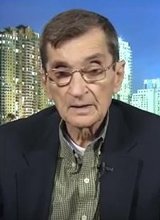 By Domingo Amuchastegui (4/27/2021)
By Domingo Amuchastegui (4/27/2021)REINSERCION INTERNACIONAL DE CUBA ANTE UNA NUEVA GUERRA FRIA
 Por Domingo Amuchastegui (4/27/2021)
Por Domingo Amuchastegui (4/27/2021)
Biden, new U.S. president in turbulent times

Biden, new U.S. president in turbulent times
The president called for unity to heal old wrongs and made clear the “leadership” of that country for world “democracy”

By Juana Carrasco Martin| juana@juventudrebelde.cu
Published: Thursday 21 January 2021 | 12:10:53 am
Translated and edited by Walter Lippmann for CubaNews.
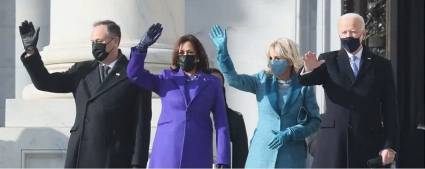
Inauguration of Joe Biden and Kamala Harris Photo: The Guardian Posted: o1/21/2021 | 12:04 am
They say that the color purple stood out at the inauguration of the 46th president of the United States, Joseph Robinette Biden Jr. The purple achieved with the mixture of red and blue -which distinguishes the Republican and Democratic parties-, symbolized in this case the search for a national unity so necessary for a good internal climate in the country. The US has supposedly reached the limit of division and chaos by the one who is already characterized as the worst leader in history, Donald Trump, who in order not to lose his egomaniacal habit said as a farewell: “I will come back somehow”.
It is a show, a spectacle of “democracy,” the presidential and vice presidential swearing-in ceremony. As such – this time without the usual crowds due to the COVID-19 pandemic, but replaced by 200,000 flags from the bars and stars located from the Lincoln Memorial to the Capitol – they heard popular entertainment industry figures such as Lady Gaga, performing the National Anthem in the area outside the Capitol, to Jennifer Lopez and Garth Brooks.
In the midst of this staging to glorify the great nation, the ceremony was opened by Senator Amy Koblucher, who gave way to Missouri Republican Roy Blunt, both of whom insisted on conciliation after the events of January 6. Their status as the top members of the Senate Rules Committee gave them that task.
Sonia Sotomayor, -the first Latina Supreme Court justice-, then swore in the first African-American, Asian, American and woman to become Vice President of the United States, the then Senator Kamala Harris, as an emblematic example of the possibilities of the American dream.
The Vice President said in her pledge that she will preserve and protect the Constitution against all enemies, domestic and foreign. This is an undeniable allusion to the events of January 6, when violent pro-Trump fanatics stormed the Capitol, a matter under investigation that is likely to leave many loose ends when it is concluded.
Trump faces impeachment in the Senate, now 50/50 Democratic controlled, for inciting the white supremacist mutineers who forced their way into Congress. The former did not attend the ceremony, but traveled to his residence and golf course in Mar-a-Lago, Florida.
Joseph Biden was sworn in before Supreme Court Justice John Roberts: “I will faithfully execute the office of President of the United States,” he said, with his hand on the Bible, “and to the best of my ability I will protect and defend the Constitution of the United States, so help me God.”
Hugs and kisses despite the pandemic, behind the transparent fence, which is known to be armored.
The almost widespread rejection of extremists and the presence of 25,000 National Guards members, in addition to the Metropolitan Police and Security Services, were more than enough to stop the demonstrations of those who are still declaring fraud in the elections of November 3rd. Nevertheless, Washington D.C., taken militarily, gave an unprecedented image for a presidential inauguration and suggested the climate that underlies the apparent tranquility of the first day of the Biden administration.
On the other hand, the new president does not have a single member of his future government team confirmed by the Senate, a disadvantage that he also owes to the stubborn Trump and the obstacles Trump put in the way of a peaceful and normal transition.
Even now, the Senate, which began confirmation hearings for Cabinet members and other key positions requiring such certification the day before, will also be busy impeaching Trump.
The Presidential Address
For 21 minutes the new president spoke to the American peole and the world, which is why he represents the empire. One word prevailed in his call, as often as it was pronounced: unity or union. The nation needs it, and it needs it very much in the face of the challenges that have arisen in four Trumpist years, the last of which was marked by the unusual event of the pandemic and its economic consequences, and by the bloody wound of racism, the extremism of white supremacists and police brutality.
Biden also repeated another term over and over again, intrinsic to the mask behind which all kinds of social inequalities are hidden: democracy.
“This, America’s day. This is the day of democracy,” he said from the very beginning of the speech. “Democracy has prevailed,” he emphasized.
He placed the coronavirus pandemic, which has already taken the lives of 400,000 Americans, and white supremacy on the same plane of challenges or challenges to his government. He assured listeners that he would “confront and defeat” a promise he had already made during his campaign but that it remains to be seen whether he can fulfill it in the four years ahead.
An optimistic and daring vision of the future, although he also recognized in that linear discourse that the forces that divide American society are deep, real and not new: racism, fear, demonization.
The objective is always the same, even if the instruments to implement it are different from those of its predecessor. But it is the confession of faith of the so-called “exceptionality” as a nation: to rebuild the economy so that the United States will once again be the force for good in the world. “Egg dogs, even if they burn your nose,” my grandmother would say. [“You can’t teach an old dog new tricks”, wl]
I wonder if this statement is just for internal consumption, because the United States should put it into practice in its view of the world. We can see each other not as adversaries, but as neighbors, treat each other with respect, stop the yelling, calm the anger that is a constant struggle, that the nation is not a state of chaos, that unity is the path to follow… At this moment and in this place we are going to begin again to see each other differently, to see each other, to listen to each other, to show mutual respect… Each disagreement does not have to be a cause for an all-out war.
Without mentioning him by name, the absent former president was subtly named to speak of security, freedom, respect, honor and truth as goals and to banish the lies that seek power and profit, and he gave his word not to think of power, but of the common good.
Internal and external repercussions
“Together, we must revive our economy, reassert our leadership and competitiveness in the long term, and restore good governance as we chart a course out of these crises. And we are fundamentally optimistic that we can do just that if we work in partnership,” wrote U.S. Chamber of Commerce President Thomas Donohue and President Suzanne Clark.
However, they added: “At the same time, the Chamber strongly warns against a return to excessive regulation or anti-competitive taxation.”
Stocks opened with gains on the first day of Joe Biden’s presidency: the Dow Jones Industrial Average opened with a gain of about 100 points on Wednesday; the S&P 500 Index opened with a gain of 0.6 percent; and the Nasdaq rose 1.4 percent thanks to a 14 percent increase in Netflix stock.
The Hill reported that Biden’s inaugural speech won immediate praise from some Republican Party senators, from whom the new administration will need the support to get its legislative agenda through Congress.
Among those legislators are Senators Lisa Murkowski (Alaska) and Susan Collins (Maine); and Senators Mitt Romney (Utah) and Pat Toomey (Pennsylvania), the latter of whom said he is “praying” for Biden.
French President Emmanuel Macron congratulated Biden and Harris, and welcomed them to the Paris Climate Agreement.
Interestingly, Senator Marco Rubio (R-Florida), acting chairman of the Senate Intelligence Committee, did not attend Biden’s inauguration because he said earlier that he would be working on resolving Senate objections to a quick confirmation of those chosen by the new president to lead that community.
Meanwhile, Frank Sinatra’s My Way was being heard at Andrews Base as former President Trump was leaving for Florida on Air Force One .
Joseph R. Biden – the second Catholic president of the United States – definitely takes office in turbulent times.
Joe Biden measures for his first days in office

Joe Biden prepares measures for his first days in office
In a memo circulated among the major U.S. media, Biden’s advisors describe such executive actions as an urgent readiness to address the most serious crises in the nation’s modern history
Author: Digital Editor | internet@granma.cu
January 17, 2021 10:01:43
Translated and edited by Walter Lippmann for CubaNews.
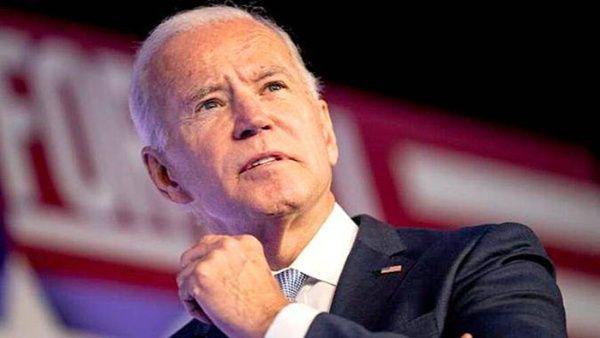
Photo: EFE
Amidst preparations for the inauguration, President-elect Joe Biden’s transition team is today preparing a set of urgent measures for the first 10 days of the administration.
In a memo circulated Saturday to the major U.S. media, Biden’s advisers describe such executive actions as an urgent readiness to address the most serious crises in the nation’s modern history.
Ron Klain, the incoming chief of staff to the next White House chief, wrote in that document that the orders will focus on ‘the Covid-19 health crisis, and its resulting serious impact, climate change and racial equity.
The official said the provisions will be accompanied by a ‘strong’ legislative agenda and are intended to provide relief to the millions of Americans struggling with these serious issues.
He added that the president-elect will take steps not only to reverse the worst damage of Republican President Donald Trump’s administration, “but also to begin to move our country forward.”
The new head of state will begin implementing the measures on Wednesday, the day he takes office, with what Klain said would be about a dozen executive orders on the issues mentioned.
The president-elect also plans to bring the country back into the Paris climate change agreement and undo the ban on travel to the United States by citizens of seven Muslim-majority countries, a measure implemented by Trump.
Biden will also issue a provision for mandatory use of masks as a requirement for staying on federally owned land or facilities and on interstate travel, and will also extend a pause on evictions and mortgages.
He even plans to take steps to mitigate the spread by expanding Covid-19 testing, protecting workers, and establishing clear health standards.
The White House will spend the remaining eight days instructing its cabinet to push for economic assistance to mitigate the effects of the pandemic and to take executive action on issues such as reunification of children separated from their families after crossing the border, among others.
The effort comes as the Senate prepares for President Trump’s second impeachment, in the early days of the Biden administration.
Although the transition team has not outlined many components of its upcoming legislative agenda, the next White House chief implemented a $1.9 trillion plan to combat the damage from the SARS-CoV-2 coronavirus, a top priority for the new administration.
(Source: Prensa Latina)
Biden and Trump on January 6, 2021

What do Joe Biden and Donald Trump think about the violent demonstrations in Washington? ( + Photos )
U.S. lawmakers were meeting Wednesday to confirm Joe Biden’s victory in the presidential election amid protests by Trump supporters both outside and inside the Capitol
Author: Digital Editor | internet@granma.cu
January 6, 2021 19:01:25
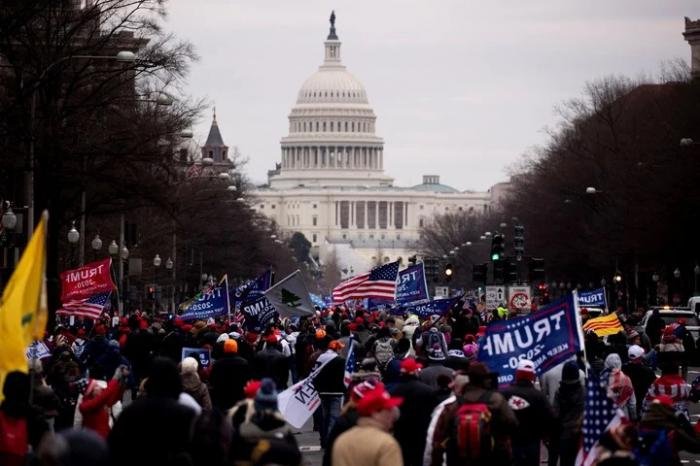
Outgoing U.S. President Donald Trump called on his extremist supporters to stop violent demonstrations in Washington, but insisted there was “election fraud.:
“I don’t want anyone to be hurt (…) I love you, you are very special, but go home. I know you are hurt. We have an election that was stolen from us, and you know it, especially from the other side,” said Trump according to Telesur TV.
The outgoing president warned that this is a very difficult time, “there was never a time like this, where something like this happened, that something was stolen, from everyone, from you, from me, from the country. It was a fraudulent election”.
Trump’s call came after a group of extremists stormed Congress to prevent certification of Biden’s election victory. At that time, the congress members left the Capitol in the custody of the authorities.
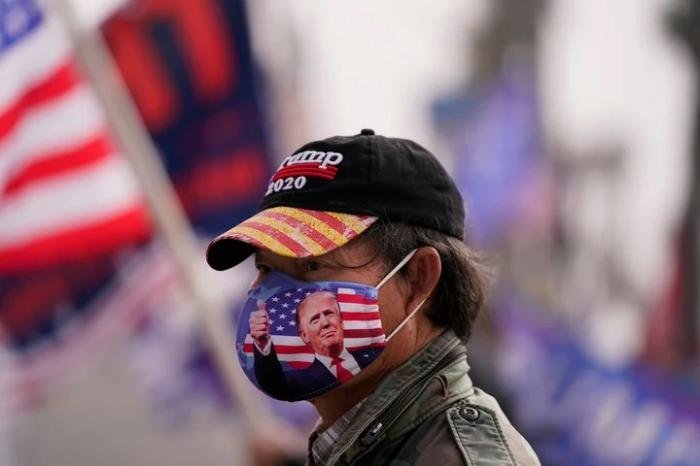
Photo: Internet
On Wednesday, president-elect of the United States, Joe Biden, repudiated the violent invasion by supporters of Donald Trump in the Capitol that caused the cancellation of the certification of the votes.
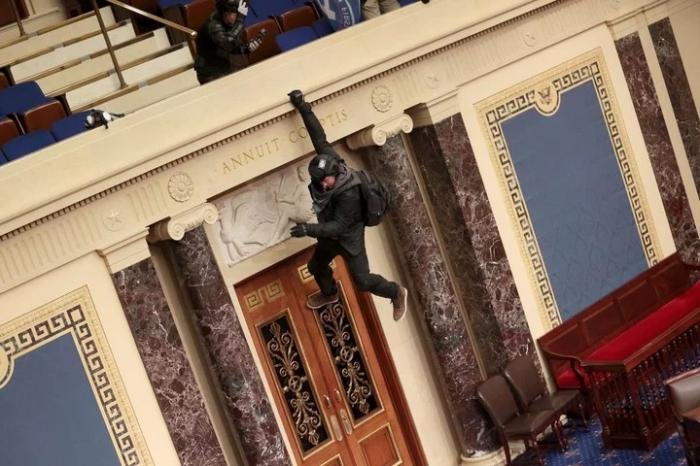
Photo: Internet
“Attacking the capitol, destroying the US Senate, endangering security. This is not a protest, it is an insurrection … I call them mafiosi, they are not attacking democracy,” Biden said.
The president-elect rejected the position of Trump’s fanatics who attacked the certification of last November’s votes, “we are seeing a small number of extremists who are dedicated to breaking the law. This is chaos and it must end now,” he added.
“The job in the coming years is to restore democracy, honor and respect. Solve the problems by looking at ourselves without stoking hatred,” the new White House tenant said.
Finally, he urged all leaders to work together to recover democracy in the country of the North, “democracy is fragile and to preserve it we need people of good will, courageous leaders, who are not dedicated to power, but to the common interest,” he concluded.
U.S. Congress meets Wednesday to certify Biden’s victory
U.S. lawmakers were meeting Wednesday to confirm Joe Biden’s victory in the presidential election amid protests by Trump supporters both outside and inside the Capitol itself.
A session that, every four years, goes unnoticed by most people has as an ingredient this year the announcement of some Republican senators and representatives, who have pledged to support President Donald Trump’s efforts to overturn the result through a formal sessional objection, in an attempt that is almost certain to fail.
The two houses of Congress, the House of Representatives and the Senate, in a joint session this Wednesday will open sealed certificates from all 50 U.S. states containing a record of their electoral votes.
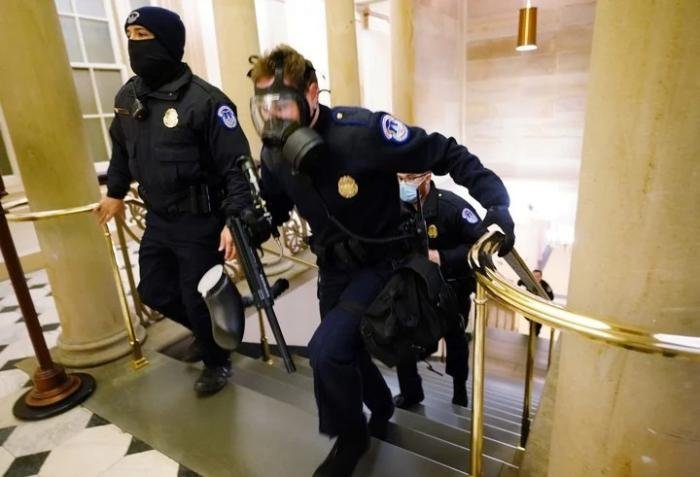
Photo: Internet
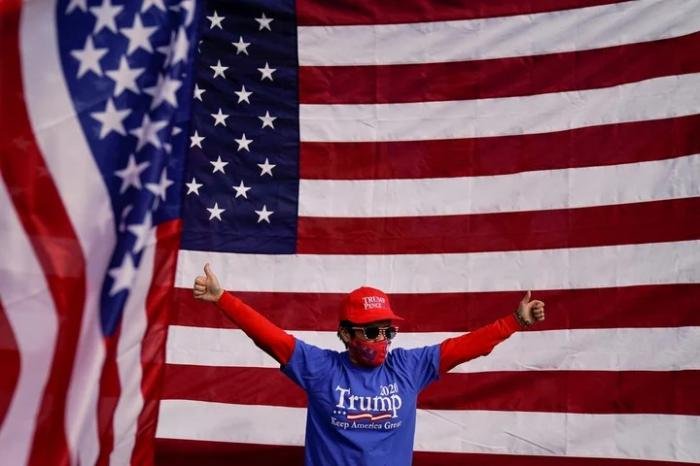
Photo: Internet
Under the U.S. system, people cast their votes for “electors,” who in turn formally vote for candidates weeks after the election, which occurred on December 14, when Biden received 306 votes under the electoral college system, compared to 232 under Trump.
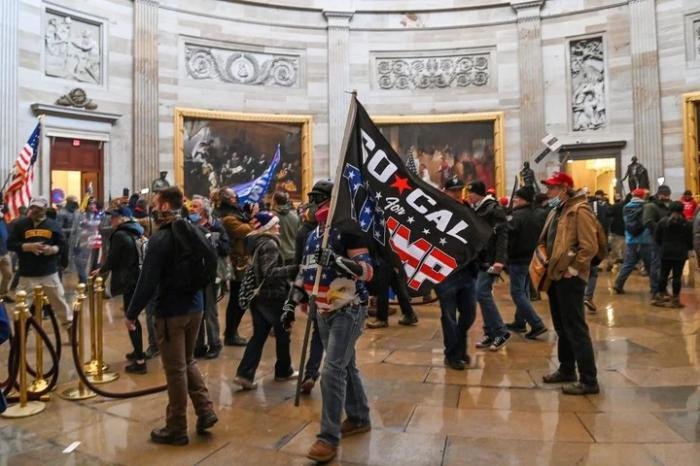
Photo: Internet
Subscribe to Blog via Email
| M | T | W | T | F | S | S |
|---|---|---|---|---|---|---|
| 1 | 2 | 3 | 4 | |||
| 5 | 6 | 7 | 8 | 9 | 10 | 11 |
| 12 | 13 | 14 | 15 | 16 | 17 | 18 |
| 19 | 20 | 21 | 22 | 23 | 24 | 25 |
| 26 | 27 | 28 | 29 | 30 | 31 | |

You must be logged in to post a comment.